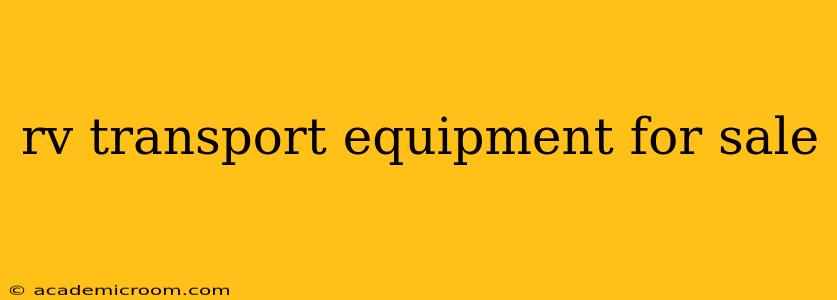Transporting your RV can be a significant undertaking, requiring specialized equipment to ensure safe and efficient travel. Whether you're a seasoned RV owner or a first-timer, finding the right transport equipment is crucial. This guide explores the various types of RV transport equipment available for sale, helping you navigate the market and make an informed decision.
What Types of RV Transport Equipment Are Available?
The market offers a range of equipment tailored to different RV sizes and transport needs. These include:
-
RV Trailers: These are specifically designed trailers built to accommodate RVs of varying sizes and weights. Features can range from simple, open trailers to enclosed trailers offering enhanced protection from the elements. Consider the weight capacity, dimensions, and features like tie-down systems when choosing an RV trailer.
-
Gooseneck Trailers: These trailers connect to the truck bed via a gooseneck hitch, providing superior stability and weight distribution, especially for larger and heavier RVs. They often boast higher weight capacities compared to conventional bumper-pull trailers.
-
Fifth-Wheel Trailers: Similar to gooseneck trailers, fifth-wheel trailers offer excellent stability for large RVs. They connect to a fifth-wheel hitch in the truck bed, allowing for better maneuverability and weight distribution.
-
Specialized RV Transport Dollies: For smaller RVs or those needing a temporary transport solution, dollies offer a cost-effective alternative. These require a towing vehicle capable of handling the RV's weight.
What Factors Should I Consider When Buying RV Transport Equipment?
Several key factors influence the selection of suitable RV transport equipment:
-
RV Size and Weight: The most critical factor. Always ensure the equipment's weight capacity exceeds your RV's gross vehicle weight rating (GVWR) by a significant margin to accommodate cargo and ensure safe towing.
-
Towing Vehicle Capacity: Your towing vehicle must have sufficient towing capacity to handle the combined weight of the RV and the transport equipment. Check your vehicle's owner's manual for towing specifications.
-
Budget: RV transport equipment prices vary significantly. Factor in the initial purchase price, maintenance costs, and potential insurance needs.
-
Distance and Frequency of Use: If you only transport your RV occasionally, a less expensive option might suffice. Frequent transport might justify investing in higher-quality, more durable equipment.
-
Features: Consider features such as tie-down systems, ramps, lighting, and enclosed protection against weather.
What are the different types of hitches used for RV transport?
Several hitch types are used depending on the trailer and towing vehicle. These include:
-
Bumper Pull Hitches: These are the simplest type, connecting to the bumper of the towing vehicle. They're suitable for smaller, lighter trailers.
-
Gooseneck Hitches: These offer superior stability and weight distribution for heavier RVs. They connect directly to the truck bed.
-
Fifth-Wheel Hitches: Similar to gooseneck hitches, these provide excellent stability and are often preferred for larger, heavier RVs.
-
Weight Distribution Hitches: These are used to distribute the weight of the trailer more evenly between the trailer axles and the towing vehicle. They greatly improve handling and stability.
How much does RV transport equipment typically cost?
The cost of RV transport equipment is highly variable, depending on the type, size, and condition. You can find used equipment at lower prices, but be sure to thoroughly inspect it for wear and tear before purchasing. New equipment will naturally be more expensive but usually comes with a warranty.
Where can I find RV transport equipment for sale?
Numerous avenues exist to find RV transport equipment for sale:
-
Online Marketplaces: Sites like eBay and Craigslist often list used equipment.
-
RV Dealerships: Some dealerships sell new and used transport equipment.
-
Specialized Trailer Dealers: These businesses often focus solely on trailers, providing a wider selection and expertise.
Remember to thoroughly inspect any used equipment before purchasing, carefully checking for structural damage, tire condition, and functionality of brakes and lights. Investing in the right RV transport equipment ensures your RV travels safely and efficiently, preserving your investment for many years to come.
